The MCG Series

The MCG Series, in collaboration with Nomos Publishing House, Baden-Baden, presents results of MCG research to both the multi-disciplinary specialist community and the interested public. The MCG Series is currently only available in German.
- Volume 9: Communication and Media Policy in the Era of the Internet. Theories and Processes
- Volume 8: Policy Change as a Governance Problem (Politikwechsel als Governanceproblem)
- Volume 7: Security and Human Rights
- Volume 6: When Governance meets Religion
- Volume 5: Regulation without Government
- Volume 4: So everything is Governance? (Alles Governance, oder was?)
- Volume 3: The Governance Perspective in Legal Innovation Research (Die Governance-Perspektive in der rechtswissenschaftlichen Innovationsforschung)
- Volume 2: Concepts of European and Transnational Governance from the Perspective of Constitutional Law (Konzeptionen europäischer und transnationaler Governance in der Perspektive des Verfassungsrechts)
- Volume 1: Perspectives of Governance Research (Perspektiven der Governance-Forschung)
Volume 9
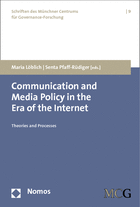
The contributions to this book approach communication and media policy in the era of the Internet from two perspectives: Theories and processes. On the one hand, special attention is given to the question of how communication policy-making is transformed due to technical evolution which is intertwined with social and economic developments. On the other hand, this book considers how these transformations can be studied and what insights are produced by distinct theoretical approaches.
Contributors are (i.a.): Maria Löblich, Senta Pfaff-Rüdiger, Sarah Anne Ganter, Johanna Jääsaari, Carles Llorens, Andreea M. Costache, Kari Karppinen, Hallvard Moe, Karen Donders, Hilde Van Den Bulck, Manuel Puppis, Matthias Künzler, Hannu Nieminen, Patrick Burkart, Jonas Andersson Schwarz, Katharine Sarikakis
Volume 8
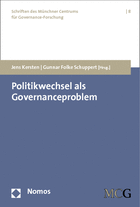
Policy changes are fast and radical changes of a policy, which, at the same time, changes social, economic or ecologic decisions and structures of a society.
Contributors are: Jens Kersten, Gunnar Folke Schuppert, Friedbert W. Rüb, Andrea Römmele, Kajo Wasserhövel, Frank Nullmeier, Matthias Dietz
Volume 7
Tanja A. Börzel / Jana Hönke: Security and Human Rights, Baden-Baden, 2012

This study investigates the security practices of multinational companies and to what extent they comply with voluntary human rights standards. This study further examines whether voluntary compliance solves the problems of insecurity caused by the presence of these firms. Drawing on two case studies of multinational mining companies in the Democratic Republic of Congo, the authors argue that it is necessary to go beyond compliance research, which focuses on the implementation of formal programmes from a top-down perspective, to evaluate voluntary standards and the effects of companies on local security. They therefore develop a conceptual framework from a ‘bottom-up perspective,’ concentrating on the entire range of companies’ local security practices, including negative effects on local security.
Volume 6
Gunnar Folke Schuppert: When Governance meets Religion, Baden-Baden, 2012
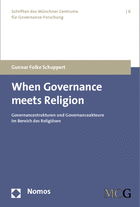
This study analyzes the relationship between governance and religion – an unprecedented perspective on two complex concepts. The relationship of state and religion is seen as a relationship between two different judicial regimes. It can therefore be categorized in the discussions on normative plurality and its consequences.
Volume 5
Stephen M. Maurer: Regulation without Government, Baden-Baden, 2011
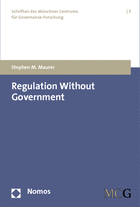
Professor Maurer’s article explains why similar “strong self-governance” experiments should be possible in most high tech industries. Further to this, he argues that industry self-governance will usually reflect democratic values. In this study, he provides renewed hope for the concept of industry self-regulation. Finally, Prof. Maurer suggests concrete steps that government can take to promote future self-governance experiments by industry.
Abstract "Regulation without Government": further information
Volume 4
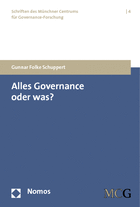
The governance concept has seen great growth in applicability and popularity. Whether this will continue remains open to question. The growing popularity in the use of the concept of Governance leads to the need for an inquiry into the true applicability of the Governance concept. In this document seven functions of the governance concept are put to the test.
Volume 3
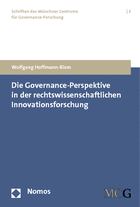
This study formulates the presumption that it is not sufficient for those who study law to look at individual standards, available types of action or concerned agents. This perspective is not new, rather can be described by the term "regulatory structures". The author explains that law must also consider (institutional) structures. In order to analyze these structures, the author uses the heuristic research function of the Governance perspective.
Volume 2

Peter Badura held the chair of public law, legal and political philosophy and taught at the Ludwig-Maximilians-University Munich from 1970 until he became an emeritus professor. This book presents a lecture when Peter Badura was invited to the Munich Center on Governance (MCG) on 1 February 2010 in the Center for Advanced Studies (CAS) of LMU Munich.
Volume 1
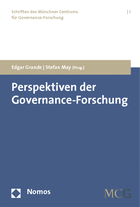
In a revised format, this volume documents the lectures that were held on December 7, 2007 at the opening event of the Munich Center on Governance (MCG). The aim of this volume is to present the status quo of research and perspectives on Governance. This is made up of the perspectives of four disciplines, which were the founding schools of the MCG. After presenting the status quo, this volume presents the MCG research programme.

